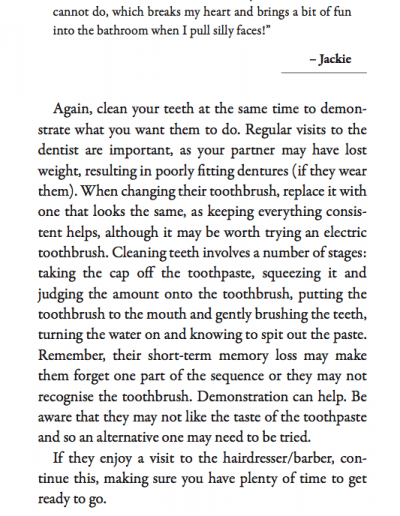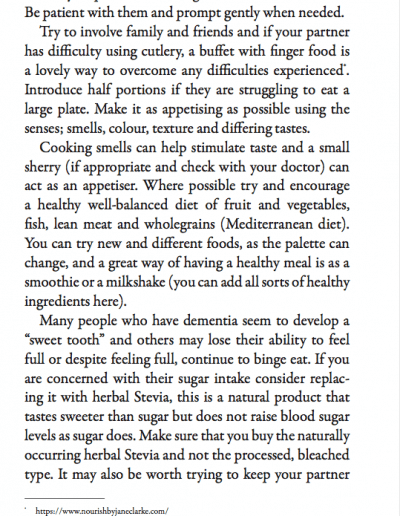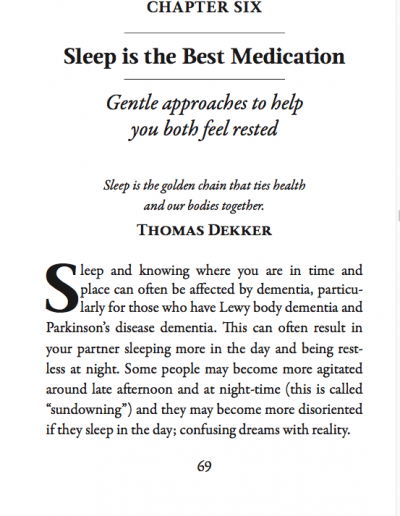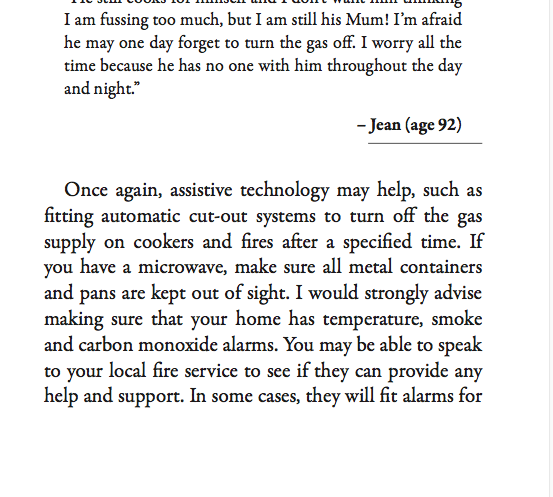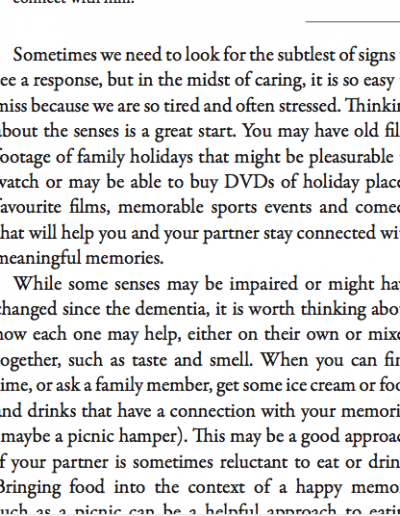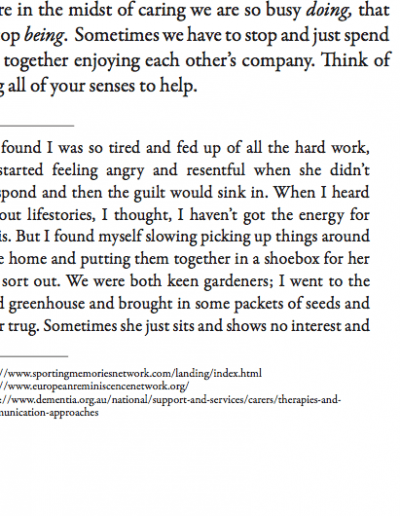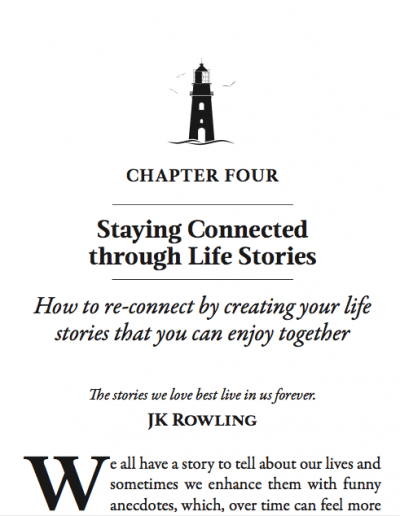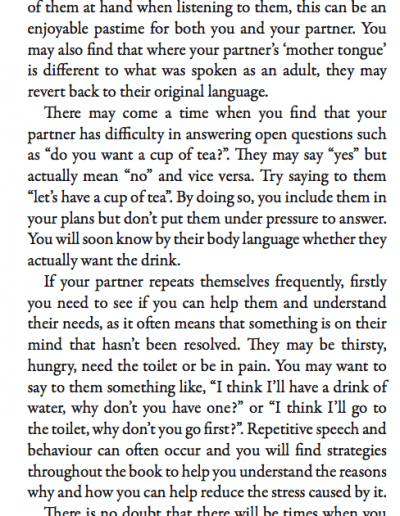The Essential Dementia Book
My name is Dr. Jane M. Mullins and I am a dementia nurse consultant. My book is here to offer support and help along the way when you or a relative or friend have received a diagnosis of dementia. This includes Alzheimer’s disease; vascular dementia; Lewy body dementia; frontotemporal dementia or Parkinson’s disease dementia as well as rarer conditions. Based on listening to and supporting people with the condition and their caregivers for over 30 years and up to date research, I can pass on my knowledge and advice to you. If you’re a caregiver, spouse, partner, daughter, son, sibling, friend or a parent, Finding the Light in Dementia is for you. The help and support in this book is also suitable for care homes, hospital staff and home caregivers.
Chapter One: A Diagnosis of Dementia, what now? – How to face up to the situation and make positive plans for the future
Chapter Two: Communicating from the Heart – How to find ways to help you communicate well together
Chapter Three: Using Memories to Keep in Touch – Creative approaches to stimulate memory and help with day to day living
Chapter Four: Staying Connected through Life Stories – How to re-connect by creating your life stories that you can enjoy together
Chapter Five: Creating a Calm, Safe Home – How to help your care partner feel content and safe at home
Chapter Six: Sleep is the Best Medication – Gentle approaches to help you both feel rested
Chapter Seven: Tips for Eating and Drinking – How good nutrition and hydration can provide balance in your lives
Chapter Eight: I am Still Me! – How to maintain your partner’s dignity and help with their appearance
Chapter Nine: Understanding Changes in Mood and Behaviour – How to listen and respond to the emotions behind mood and behaviour
Chapter Ten: Altered States: Hallucinations, Delusions, Misperceptions – Try new approaches to avoid distress
Chapter Eleven: Caring for the Caregiver – Quick and easy ways to nurture and replenish yourself
Chapter Twelve: Considering Care – What to look for in choosing caregivers, respite and care homes
Each chapter in Finding the Light in Dementia™
-
- Explains what your loved one may be feeling and how they experience the world around them
- Provides valuable tips and advice that will help you both
- Gives examples through short caregiver stories
- Is written in larger font that is easier to read
- Provides summary pages at the end to refer to quickly in a time of need
- Provides mood and behavior journals
- Gives quick references when considering professional care and what to pack in the event of a hospital admission
- What to look for when considering residential care
- Is a comprehensive resource for your loved one’s care needs and yours!
The notes pages at the end of each chapter will help you:
- Chart your loved ones specific needs, likes and dislikes, what works well and what doesn’t, for your use and other family members/professional caregivers
- Chart activities that may be enjoyed or not; what may trigger certain changes in mood and behaviour and what can help, such as life history information
- Create a care plan/diary for yourself and other family members/caregivers
- Document changes that may happen over time
- Acts as an aide memoir for questions you may want to ask your doctor and other health and social care professionals, and for them to write in at appointments (to save you memorising everything

“Thank you for writing this book! I found this so useful and a real eye opener, its given me real practical advice and helped me understand my husband and shown me ways to cope better, we are both much less stressed from following your tips. Beautifully written and very readable. Its easy to use, I can pick it up and refer to it quickly in times of need. I’ve already recommended it to several people”
You can also order Finding the Light in Dementia, a Guide for Families, Friends and Caregivers from your local bookshop.
Other publications
- Mullins, Jane, 2024. “From Coffee in Mumbai to Marmite in Scotland: Journeying through the Sensory
Stories of People Living with Dementia and Their Carers,” Storytelling, Self, Society: Vol. 19: Iss. 1, (4).
Available at: https://digitalcommons.wayne.edu/storytelling/vol19/iss1/4 - Mullins, J.M., and Morgan, N., May 2024. Finding the Light in Dementia. The Tourism Society.
- Mullins, J.M., Tales, A., Musselwhite, C., Rich, N., 2022. “Rekindling couplehood” using a multisensory suitcase of memories: A pilot study of people living with moderate dementia and their partners, Ageing & Society, https://doi.org/10.1017/S0144686X21001926
- Mullins, Jane M. Book Review: “Wandering the Wards: An Ethnography of Hospital Care and its Consequences for People Living with Dementia.” 2021: 14713012211054370.
- Hopkinson, J.B., King, A., Mullins, J., Young, L., Kumar, S., Hydon, K., Muthukrishnan, S., Elliott, F. and Hopkinson, M., 2021. What happens before, during and after crisis for someone with dementia living at home: A systematic review. Dementia, 20(2), pp.570-612.
- Mullins, J.M., 2021. Book Review: Alison Milne, 2020. Mental Health in Later Life: Taking a Lifecourse Approach. Bristol: Policy Press, 360 pp. ISBN 9781447305712 (paperback). International Journal of Ageing and Later Life, 15(1), pp.193-196.
- Burholt, V., Davies, J., Boyd, M., Mullins, J.M., Shoemark, E.Z. and Centre for Ageing, Dementia Research, Expert Review Group on Continence, Dementia, 2020. A research agenda for promoting continence for people living with dementia in the community: Recommendations based on a critical review and expert‐by‐experience opinion. Journal of Clinical Nursing.
- Mullins, J.M. (2019), A Suitcase of Memories: Helping couples communicate and reconnect with multisensory holiday reminiscences, Journal of Dementia Care, 27(6), pp. 18-19.
- Mullins, J.M. (2018), A Suitcase of Memories: A sensory ethnography of tourism and dementia with older people, Doctoral thesis, Cardiff Metropolitan University
- Mullins, J. and Fitch, F., 2000. Diagnosis by request: A self referral memory clinic. Journal of Dementia Care, 8(2), pp.30-31.
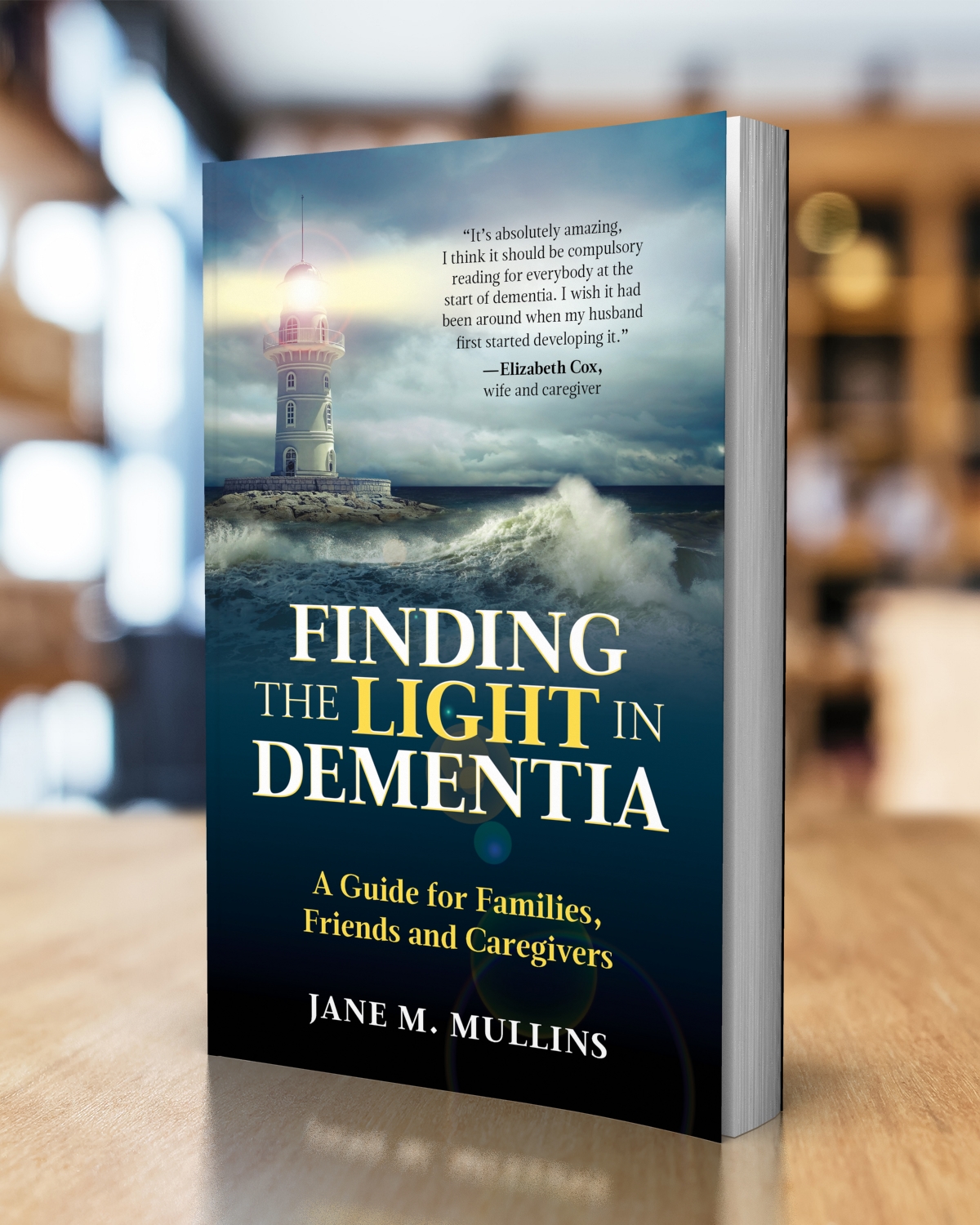
Finding the Light in Dementia: A Guide for Families, Friends and Caregivers
Paperback
It’s absolutely amazing, I think it should be compulsory reading for everybody at the start of dementia. I wish it had been around when my husband started developing it
Finding the Light in Dementia: A Guide for Families, Friends and Caregivers is an essential book that explains common changes that can occur in those living with dementia. By offering valuable approaches, tips and stories, I can help readers learn to care for and maintain a connection with their care partner.
This book offers hope and strength to all of those affected by dementia, whether you’re a spouse, partner, daughter, son, sibling, friend or a parent caring for a loved one. Finding the Light in Dementia will help you discover:
- How to make sense of dementia.
- How to communicate and stay connected with your loved one.
- What to say and do during difficult and challenging circumstances.
- How to care with confidence.
- How to reduce stress and distress in you both.
- Short and easy to read chapters with summaries to quickly refer to at times of need.
- Notes pages to write in, to tailor the information to your situation acting as an aide memoire/diary about your loved one’s likes & dislikes and what approaches work or don’t work.
- Ways to communicate your loved one’s needs to other family members, caregivers and professionals.
- Question prompt sheets for when visiting your doctor or health professional to act as a reminder.
- Checklists for when considering respite/residential care or during a crisis
Planning ahead may help to avoid difficult situations arising and sometimes even avert a crisis
FIVE STAR AMAZON REVIEW
The best bit about this book is it is easy to read – short chapters and clearly written with very little jargon, so it is very accessible. It’s also helpful to have sections for making notes about your own circumstances, the idea being that you have the day to day information to take to a doctor if needed.
The book takes you through from initial diagnosis and it truly does “find the light” in all stages of that journey. It is reassuring for someone who has little or no experience with dementia to know that as a carer they are not alone, as quotes and comments from real life people are included throughout. It is a very positive book and has real tips and techniques for dealing with the situation of having a loved one suffering from such a cruel disease. Sandra, daughter

Finding the Light in Dementia: A Guide for Families, Friends and Caregivers
BOOK AVAILABLE NOW
Buy on Amazon

